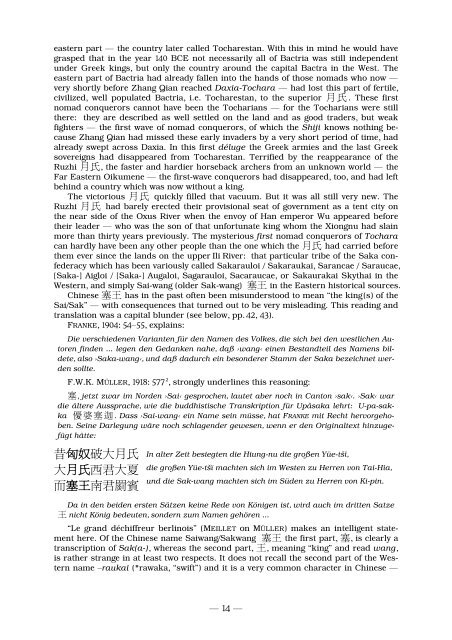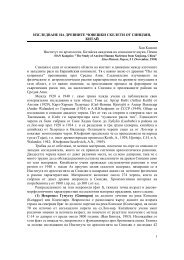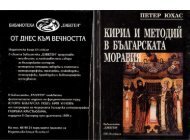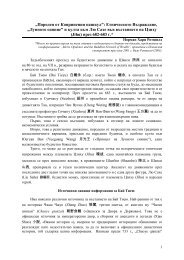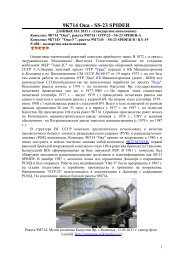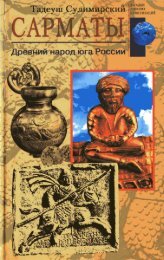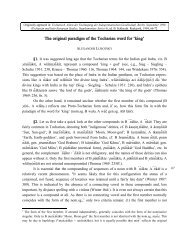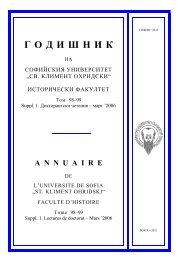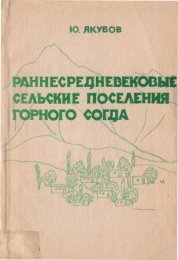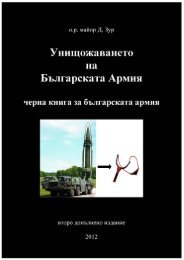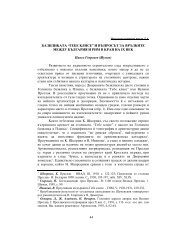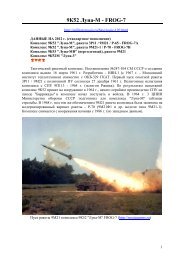You also want an ePaper? Increase the reach of your titles
YUMPU automatically turns print PDFs into web optimized ePapers that Google loves.
e astern part — the country later called Tocharestan. With this in mind he would have<br />
grasped<br />
that in the year 140 BCE not necessarily all of Bactria was still independent<br />
u nder Greek kings, but only the country around the capital Bactra in the West.<br />
The<br />
eastern<br />
part of Bactria had already fallen into the hands of those nomads who now —<br />
v ery shortly before Zhang Qian reached Daxia-Tochara — had lost this part of fertile,<br />
civilized, well populated Bactria, i.e. Tocharestan, to the superior 月氏. These first<br />
nomad<br />
conquerors cannot have been the Tocharians — for the Tocharians were still<br />
there:<br />
they are described as well settled on the land and as good traders, but weak<br />
fighters<br />
— the first wave of nomad conquerors, of which the Shiji knows nothing be-<br />
c ause Zhang Qian had missed these early invaders by a very short period of time, had<br />
alr eady swept across Daxia. In this first déluge the Greek armies and the last Greek<br />
sovereigns<br />
had disappeared from Tocharestan. Terrified by the reappearance of the<br />
Ruzhi<br />
月氏, the faster and hardier horseback archers from an unknown world — the<br />
F ar Eastern Oikumene — the first-wave conquerors had disappeared, too, and had left<br />
behind<br />
a country which was now without a king.<br />
The victorious 月氏 quickly filled that vacuum. But it was all still very new. The<br />
R uzhi 月氏 had barely erected their provisional seat of government as a tent city on<br />
t he near side of the Oxus River when the envoy of Han emperor Wu appeared before<br />
t heir leader — who was the son of that unfortunate king whom the Xiongnu had slain<br />
more than thirty years previously. The mysterious<br />
first nomad conquerors of Tochara<br />
can hardly have been any other people than the one which the 月氏 had carried before<br />
them<br />
ever since the lands on the upper Ili River: that particular tribe of the Saka con-<br />
f ederacy which has been variously called Sakarauloi / Sakaraukai, Sarancae / Saraucae,<br />
[ Saka-] Aigloi / [Saka-] Augaloi, Sagarauloi, Sacaraucae, or Sakaurakai Skythai in the<br />
W estern, and simply Sai-wang (older Sak-wang) 塞王 in the Eastern historical sources.<br />
Chinese 塞王 has in the past often been misunderstood to mean “the king (s) of the<br />
Sai/Sak”<br />
— with consequences that turned out to be very misleading. This reading and<br />
translation<br />
was a capital blunder (see below, pp. 42, 43).<br />
FRANKE, 1904: 54–55, explains:<br />
Die verschiedenen Varianten für den Namen des Volkes, die sich bei den westlichen Autoren<br />
finden ... legen den Gedanken nahe, daß ›wang‹ einen Bestandteil des Namens bildete,<br />
also ›Saka-wang‹, und daß dadurch ein besonderer Stamm der Saka bezeichnet werden<br />
sollte.<br />
2<br />
F.W.K. MÜLLER, 1918: 577 , strongly underlines this reasoning:<br />
塞, jetzt zwar im Norden ›Sai‹ gesprochen, lautet aber noch in Canton ›sak‹. ›Sak‹ war<br />
die ältere Aussprache, wie die buddhistische Transkription für Upâsaka lehrt: U-pa-sakka<br />
優婆塞迦. Dass ›Sai-wang‹ ein Name sein müsse, hat FRANKE mit Recht hervorgehoben.<br />
Seine Darlegung wäre noch schlagender gewesen, wenn er den Originaltext hinzugefügt<br />
hätte:<br />
昔<br />
大 月氏西君大夏<br />
而 塞王南君罽賓<br />
匈奴破大月氏 In alter Zeit besiegten die Hiung-nu die großen Yüe-tšï,<br />
die großen Yüe-tšï machten sich im Westen zu Herren von Tai-Hia,<br />
und die Sak-wang machten sich im Süden zu Herren von Ki-pin.<br />
Da in den beiden ersten Sätzen keine Rede von Königen ist, wird auch im dritten Satze<br />
王 nicht König bedeuten, sondern zum Namen gehören ...<br />
“Le grand déchiffreur berlinois” (MEILLET on MÜLLER) makes an intelligent state-<br />
m ent here. Of the Chinese name Saiwang/Sakwang 塞王 the first part, 塞, is clearly a<br />
transcription of Sak(a-), whereas the second part, 王, meaning “king” and read wang,<br />
is rather<br />
strange in at least two respects. It does not recall the second part of the Western<br />
name –raukai (*rawaka, “swift”) and it is a very common character in Chinese —<br />
— 14 —


